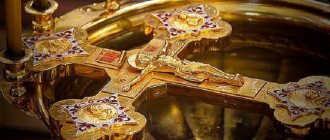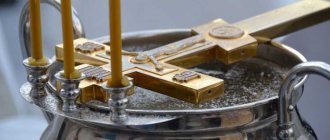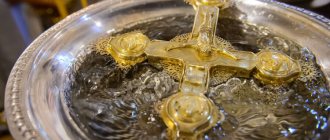If stored improperly, water may spoil.
Agiasma - holy water - has amazing properties. It strengthens the body, spirit and gives great happiness to touch the Church, no matter where a person is.
What makes the water unique is that the water remains fresh for a long time and does not lose its healing properties. Typically, believers collect blessed water once a year and use it in various situations. But what to do if a year has passed and there is still water left?
How to use holy water from last year
Holy water does not lose its beneficial power for a long time, and there is no reason to get rid of it. If the liquid has not spoiled, become cloudy or acquired a foul odor, then the water is calmly consumed internally for any need with prayer and reverence, and in emergency cases - daily. We must remember that holy water is a gift that is accepted with gratitude.
But if for some reason a person is afraid to consume precious moisture, then recommendations for using old consecrated water will help:
- Washing. Wipe your face with a small amount of water, preventing the liquid from entering the wastewater. The effects of agiasma are especially beneficial for sick and restless young children. It is not necessary to wipe your face; you just need to let the drops dry.
- Bathing. The Church does not forbid taking a bath with the addition of holy liquid only in exceptional cases, for sick and exhausted people, and only with the permission of the clergyman. For people who are healthy in spirit and body, it is enough to wipe their torso with their palms soaked in holy water after bathing in ordinary water.
- You can water the flowers with last year's liquid. Sprinkling the bed and food of a sick person, wetting compresses and applying to places affected by illnesses.
- Use when watering indoor plants.
- Cross-shaped sprinkling of living and working premises, personal belongings or a car, accompanied by the reading of a prayer.
- Cleansing the home from negativity or in case of frequent quarrels among household members, combining agiasma, a church candle and saying a prayer.
- Sprinkling pets, protecting them from diseases with prayers. You should not give liquid to pets to drink; the animal will not be able to perceive water as a shrine.
- Anointing with water before making an important decision.
You should not collect blessed water for future use. You can always collect godly liquid at the nearest temple on any day.
Is it possible to give water special powers?
Various religions use holy water for cleansing, protection and blessing. In many religious traditions (including Catholicism and some pagan traditions), holy water is created by combining water with salt. Typically, both salt and water must be ritually blessed (together or separately) for the water to be considered holy.
Many religions believe that holy water can only be truly blessed by an ordained priest. For this reason, depending on your faith, you may not be able to create real holy water in the literal sense.
By the way, winter swimming in consecrated reservoirs on the feast of Epiphany does not replace the sacrament of confession. Priests remind that Christians should participate in church services.
Where can I pour it?
It is better to store the shrine next to the icons. The vessel with holy water is kept in a dark place, next to household icons. With respect, water retains its healing properties for a long time.
But if stored incorrectly, water can lose freshness and spoil (we described the reasons for this here). In this case, it would be correct to pour out last year’s water. However, there are certain places where liquid can be disposed of and where it should not be poured. Acceptable locations include:
- An untrodden place. It is allowed to use any piece of land where no person walks or where stray animals do not run.
- Open water. The best solution is to pour old holy water into a river or stream with a current.
- Dry well or drainage system at the temple. Draining is carried out with the permission of the priest.
It is considered unacceptable for consecrated moisture to come into contact with sewage - a sewer drain or a cesspool. Pouring liquid into a sink or toilet is considered extreme disrespect for something sacred.
When pouring water, you need to say words of gratitude for the time it was in the house.
For many centuries, holy water has given hope to praying people, strengthened faith and given strength. The healing properties are accepted and approved by the Church. A respectful attitude towards agiasma gives it great power, and it, in turn, helps in family and everyday situations.
Where should I put last year's Epiphany water?
The main task of Epiphany water is to heal and help people. Therefore, under no circumstances should you type it just in case, because everyone does it. You cannot store it in large quantities all year and then throw it away. It is believed that she does not like being locked up, because this is not a shrine at all. Water needs to be beneficial. This is its main purpose.
What to do with last year’s Epiphany water:
- Therefore, you should never take too much water if you do not plan to use it. To quickly use up a large amount of water, when Epiphany approaches, you can use it for almost all purposes.
- Washing with such water promotes rejuvenation, reduces oily skin, and helps fight acne. Water gives youth and freshness to the skin. It is recommended to rinse your hair with this water so that it grows better.
- It is not necessary to use Epiphany water exclusively for medicinal purposes. It can also be used to look more attractive.
On the lake
Under no circumstances should you put Epiphany water into glass beer and vodka bottles without first removing the labels from them. The water should not be contaminated with anything; before you take in the liquid, you should thoroughly wash the bottles and containers in which you plan to take the miraculous remedy.
Useful articles on the site:
- Is it possible to brush your teeth, eat, drink before Communion in church?
- How to write notes about health and repose correctly
- How to pray correctly at home, in church, in front of an icon, relics
- Is it possible to get married again in church a second time with another person?
- Is it possible to get married in a church on Saturday, Friday, Wednesday, Monday?
How to Use Holy Water: Do's and Don'ts
With the help of holy water, people treat illnesses, restore their state of mind and protect their homes.
Holy water is a shrine that is present in the home of a believer. It is collected in churches after prayer and consecration and carefully used for needs.
All Orthodox Christians sincerely believe that the holy liquid helps with illnesses, the treacherous invasion of dark forces and the removal of sins. By sprinkling your home, lubricating sore spots and taking it internally, the miraculous properties of water appear every time.
Respectful attitude and proper storage is the key to the long service of fresh life-giving moisture.
Holy water is a gift given by the Lord and the attitude towards it should be special. When collecting blessed water, you must follow the following rules:
- The liquid container must be cleanly washed and without stickers.
- Do not take in large amounts of water. Moisture collected for future use is considered “imprisonment of the shrine” and may lose its healing properties. If there is a shortage, you can always get it at any nearby temple on any day of the year.
- When receiving and giving holy water, it is forbidden to use foul language or quarrel. Swearing destroys the faith and prayer of the asking Christian.
- Use for fortune telling and magical rituals.
Epiphany water, when to collect?
Many people believe that water must be taken strictly after 12 midnight on January 19th. In fact, this is not so, because church services are held starting in the evening.
Epiphany water, when to collect:
- It is from 18:00 on January 18 that you can collect the first batches of water. It was then that the first services with the blessing of water were held. As for water from sources and rivers, it is recommended to sample it on the night of 18 to 19.
- Preferably from 12 midnight until dawn. According to the rules of the church, the feast of Epiphany is celebrated throughout the week, and the water is re-blessed. You can come any day during the week after Epiphany and collect the required batch of water.
- However, if a person wants to take water from the tap, it is recommended to do this from 00:00-01:30 at night. It is believed that only during this period the liquid has healing properties and can be used during various manipulations for healing.
How to use it correctly
Watering indoor flowers
Blessed water, with proper use and reverence, is capable of retaining its granted properties for a long time. However, if during long-term storage the water changes color or an unpleasant odor appears, then the parishioner is faced with the question of whether it is possible to water indoor plants or flowers with spoiled water?
The clergy favorably give permission to dispose of water in this way. If there are no plants in the house, then the remaining water can be watered on a tree or shrub on the territory of the Church.
How to consecrate an apartment?
Is it acceptable to place water on the floor?
Agiasma is the same shrine as icons or other church paraphernalia and requires due respect. The floor or ground is considered a place where a sinner can pass, and if the vessel is placed on the floor, the water may be contaminated and lose its healing effect. Before collecting moisture, you should consider where to place the container upon arrival home, without resorting to placing it on the floor. If the action is forced and short-term, then it is permissible. The only place where you can place dishes with water on the floor is the temple.
Medicine and water
Sick people fervently believe that drinking medicine with consecrated water will enhance the effect of the pills, and the disease will quickly and inevitably recede. When asked whether it is possible to drink medicine with agiasma, the clergy answer that there is no strict prohibition on the action, nor is there consent.
Of course, if at the time of taking the medicine there is no ordinary water at hand, then drinking holy water is not considered blasphemy. But if you have a choice, you should not combine medications and shrines.
Diluting holy water with regular water
By collecting a large amount of holy liquid in a temple, a person automatically becomes hostage to the superstition that water contains magical power and does not think that every drop is full of prayer and is a blessing from God.
It is not forbidden to dilute holy water and is only encouraged if a person needs to drink agiasma. It is enough to bring a small amount of water from the temple in a small container and at home, with prayer, add it drop by drop to ordinary water, it will immediately acquire miraculous properties. But the right advice would be to regularly attend Church and receive new consecrated water.
Is it possible to wash your face with holy water?
Application to animals: is it possible or not?
The holy scripture says that animals should not touch the shrine. Therefore, drinking holy water to pets is prohibited. However, if the animal is facing a fatal disease, and the owner hopes for a better outcome, then a few drops added to the main drink will not be superfluous. But, by the way, the animal will not be able to appreciate the good liquid, and only the owner’s faith will help overcome the disease. Sprinkling life-giving moisture on pets is not prohibited. The combination of prayer against illness and sprinkling with holy water will protect your pet from harm.
Using agiasma when cleaning
Washing floors with blessed water is prohibited; walking on feet after cleaning is considered desecration. Use when washing various surfaces is also not permissible. Sprinkling of the home is permitted, and if moisture gets on the floor in the process, then there is no sin in it. If a container of water falls and spills on the floor, then collect the moisture with a clean napkin, squeeze it into another container and either water the flowers or pour it into running water.
Consecration of the cross at home
The best protection for an Orthodox Christian is considered to be a cross consecrated by a clergyman in a church. But if immediate divine protection is needed, then the cross can be consecrated independently. To carry it out you will need holy water and prayer in front of the icon for the help of the Lord.
Why drink Epiphany water?
Only if a person firmly believes in the healing properties of water will this help get rid of a significant number of ailments, cleanse the aura in the house, and also improve well-being.
Why drink Epiphany water:
- A person who suffers from depression should drink a tablespoon of Epiphany water every morning on an empty stomach, first dissolving it in a glass of ordinary tap water. It is believed that it relieves melancholy, drives out evil spirits that sit inside a person, provoking depression and bad mood.
- If a person is being treated for a serious illness during this period, it is recommended to take medications with Epiphany water. It can also be added in the amount of a tablespoon per glass of water.
- But, in addition, the remedy is widely used to treat children and the evil eye. Therefore, if some misfortune happened in the house, a child fell ill, then it is necessary to sprinkle him with Epiphany water and read a prayer for recovery. This water is used for almost any trouble, ailment and problem.
What to do with unused
Where is holy water poured? Sometimes it happens that consecrated water has spoiled, and a person is afraid to drink it internally. Then the remaining water is poured into a place far from sewage. You can’t pour it onto a path where people or animals walk, or into a sewer! This is extreme disrespect for the shrine. An acceptable place for draining unsuitable moisture is a river with a current, an open reservoir, a tree at a temple, or indoor plants.
The blessing of water is a great sacrament. It makes it possible to return to pristine purity and get closer to the Lord. Using holy water a person heals his soul and body.
Magic properties
Some people attribute various magical properties to holy water. For example, they believe that it itself has some power. In fact, water is used as a tool to connect with God. It will not have any impact on a person without his personal belief in what is happening.
Adding wood ash to the soil: how to prepare a greenhouse for the summer season
What can be made from two old pallets: an idea for the garden
“Once every couple of months I choose a favorite”: an Australian shared his education system
Cleansing sins by bathing
Sometimes believers believe that swimming in an ice hole during Baptism will help them get rid of all sins. Allegedly, after this action, God will forgive them all their wrongdoings. Some theologians take a different point of view. In their opinion, forgiveness is possible only after humility and understanding of one’s actions. Swimming in an ice hole is fraught with various problems. For example, because of this you can quickly get sick and catch a cold.
Sins are forgiven during confession and performing godly deeds. They can also be redeemed by the spiritual improvement of man. Simple bathing is not enough in this case. It will not lead to any purification. However, the process itself sometimes inspires people, and they turn away from their sinful path. That is, in this case, bathing becomes the starting impetus for internal changes.
The main thing is not to worry
Photo: Flickr.com
An Orthodox Christian should not consider ordinary everyday things to be bad omens. A Christian should not take seriously the signs left over from the times when our ancestors were pagans, in whose lives there were many superstitions.
If holy water has spoiled, this is not some kind of bad omen. Holy water protects and preserves a person, helps in many matters. But if it has deteriorated, this does not mean that God’s Grace has left the house; now troubles and misfortunes should be expected. These are ordinary superstitions that have no place in the life of an Orthodox Christian.
The Holy Fathers at all times instructed parishioners, urging them not to look for any signs in the world around them, not to give in to superstitions, no matter what they are - positive or negative. All this should be treated with complete indifference.
A believer must remember that everything is the will of the Almighty. She needs to be completely trusted, live in accordance with the commandments left to people by the Almighty, and, in addition, be guided by the advice of the holy fathers. A person’s salvation depends only on God’s will, on whether he diligently fulfills the commandments and works to lead a sinless life.











